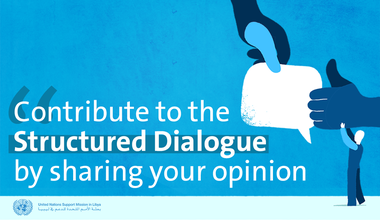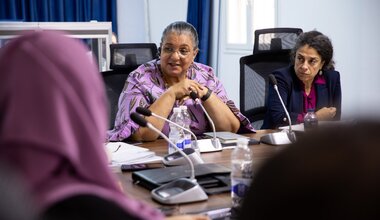UNSMIL, EU provide Libyan coastguard with gender sensitization training
United Nations officials are mentoring Libyan coastal guards regularly engaged in risky search-and-rescue missions at sea. In the process, they are arming them with greater awareness of how to deal with migrants and refugees, some of the most vulnerable of whom are women.
The one-day UN training has been designed to provide a basic understanding of gender concepts as they apply to coastguard activities, especially the challenges faced in supporting female migrants. Utilizing participatory methods and interactive discussions, the session encouraged objective exchanges on gender-related issues and encouraged participants to reflect on their own experiences.
Nine senior Libyan coastguard colonels and navy captains received mentoring by Women Empowerment Section Gender Officer Ms Noor Tawil and the E.U.’s Mediterranean Naval Force Social Affairs advisor Major Erika Monticone on 4 April 2017 as part of a ten-day training in Malta. This was the third group to undertake the three-hour training session on gender sensitization that the U.N. offers as part of the Maltese armed forces’ ‘On-Scene Coordinator Course’ learning requirement to Libyan coastguards, provided with the support of the E.U. Navy’s Operation Sophia.
“Incorporating women within the rescue operations would improve the overall effectiveness of the rescue,” one of the participants stated. “This has to be done gradually in order not to clash with cultural norms.”
Similar to their predecessors, the senior Libyan coastguards were open to the idea of having women as colleagues in rescue operations, to be based on shore.
As one of the participants stated, “For the time being it is best for women to be part of the medical and psychosocial support staff, providing migrant women with services they need in the camps after the rescue, either through the Red Crescent or directly as part of the coastal guard institution,”
By the end of the session, there was a consensus among participants that including women down the line would render the rescue operations more successful, particularly when attending to and assisting distressed female migrants.
In the recent past, Libyan women were part of the military and police forces. As one participant stated “it is only a matter of time till we see female Libyan colleagues in the Navy and Coastal Guards Units again.”
The course covers Maritime Assistance Policy, legal issues like the obligations of ships at sea, Basic Drift Theory, Planning and Conducting Search, Rendering Assistance, Medical Evacuations, Search Plan Variables, Care of Survivors/Human Treatment and Gender Sensitization.
 United Nations Peacekeeping
United Nations Peacekeeping UN
UN













